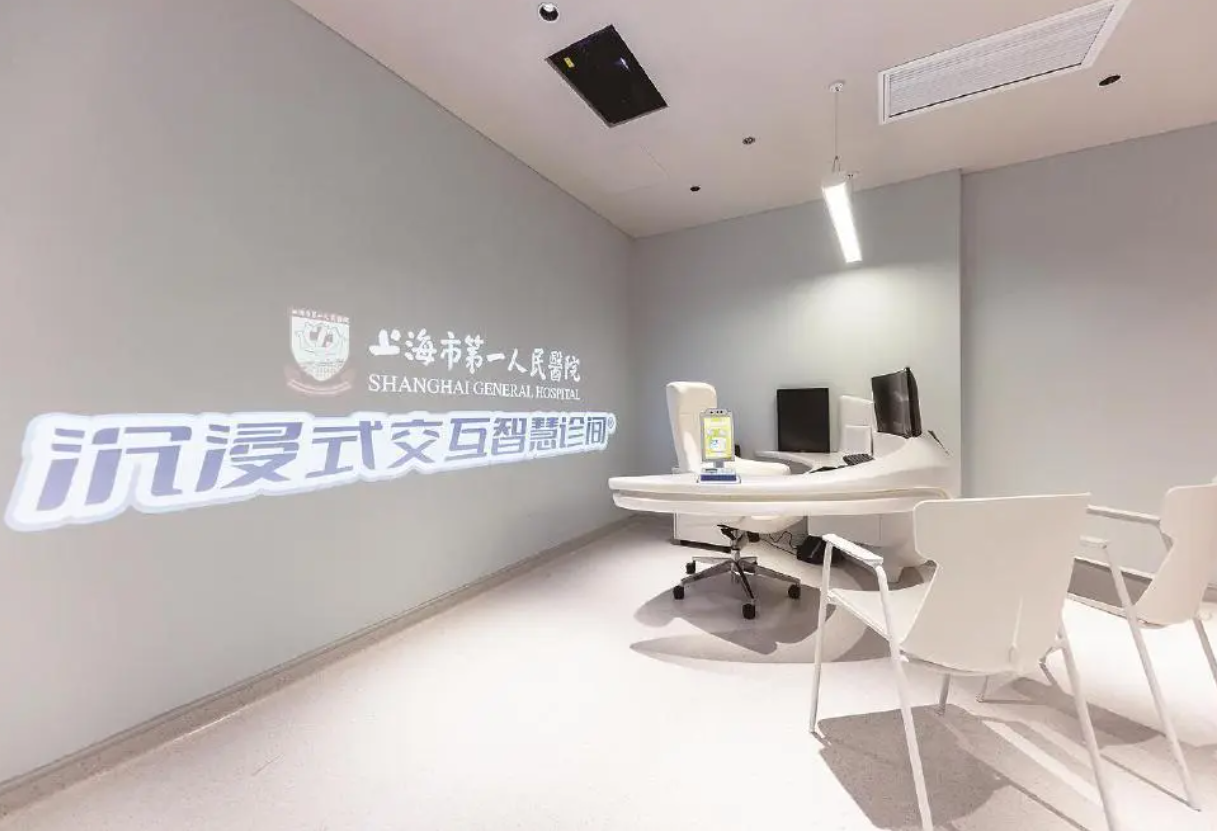- News
SGH 160th Anniversary |The Shanghai Mercury(Wen Hui Bao) features a report on Shanghai General Hospital: Enhancing Patient Experience Through High-Quality Development
公济160 | 《文汇报》专题报道市一医院:以高质量发展提升群众就医体验
The sunken plaza in the Hongkou campus of Shanghai General Hospital offers a welcoming space where patients can pause and rest.
"From the beginning of planning, the Phase II expansion of the Songjiang campus has been positioned as a hospital that serves as a 'functional core' for efficient medical activities, a 'landmark' of advanced architectural concepts, a 'guardian' for patients, and a 'leader' in green healthcare."

The new construction is expected to span nearly 160,000 square meters, extending from the original Phase I buildings. New additions will include Inpatient Buildings A and B, Outpatient and Medical Technology Buildings A and B, a Comprehensive Research Building, a Fever Clinic, an underground parking lot, and more. These building clusters will be interconnected with corridors to ensure seamless functionality and complementarity.
As the hospital expands its medical spaces, it also emphasizes a blend of cultural and ecological considerations, aiming to create a "forest-style" hospital landscape. Designs incorporate green roofs, walkable gardens, sunken courtyards, riverside eco-parks, serene water platforms, and pedestrian bridges, merging the architecture with the natural landscape.
Beyond enhancing the physical environment, the hospital’s services are equally focused on humanistic care.
In 2020, Shanghai General Hospital became the first comprehensive hospital in Shanghai to establish an independent Patient Experience Department. This department is dedicated to improving patients’ experiences through a “Four-in-One” system that enhances medical service flow, holistic health management, logistical support, and community feedback mechanisms, all aimed at improving patient satisfaction.
With the deepening of population aging, the demand for healthcare services among the elderly is increasing. According to statistics, those over 60 years old make up one-third of outpatient visits and over half of inpatients at Shanghai General Hospital, making elderly patients the hospital’s primary service demographic.
To transform the "digital divide" faced by elderly patients into a "digital advantage," Shanghai General Hospital is continuously upgrading its services to be more "elderly-friendly." To meet the healthcare needs of elderly patients, the hospital has introduced a series of smart medical services tailored specifically for them.
Shanghai General Hospital has created a new “Smart Cloud-Based Healthcare Service System” that covers the entire treatment process through functions such as “Cloud Customer Service, Cloud Pre-diagnosis, Cloud Triage, Cloud Consultation, Cloud Escort, Cloud Evaluation, Cloud Record, and Cloud Management.” For example, in the “Cloud Escort” function, children of patients can apply to become their parents' “health managers.” When parents visit the internet hospital, notifications are automatically sent to the children's phones, allowing them to participate remotely in the entire consultation process via a link for a three-way video interaction. They can also view their parents' electronic medical records, prescriptions, examination and test reports, and billing information.
Offline, the hospital has upgraded its self-service machines to be more senior-friendly. After inserting a medical insurance card, the new-generation intelligent self-service machine automatically activates the “Elderly Care Mode” based on the patient’s age. In this mode, the font size on the machine’s screen is automatically enlarged to help seniors “see more clearly,” and it also provides full voice guidance to ensure they “hear instructions clearly.” The self-service machines can also adjust the module layout based on the specific stages of the patient’s treatment, prioritizing necessary tasks at the forefront of the interface and providing guidance for each step, making it easier for patients to complete various procedures quickly.
Shanghai General Hospital has also brought cloud-based consultation services into nursing homes, using the “Internet Hospital + Nursing Institution” model to support the high-quality development of integrated healthcare and elderly care in the “Five New Towns.” In 2023, Shanghai General Hospital was recognized as an “Outstanding Service Brand for Elderly-Friendly Medical Institutions in Shanghai.”
These thoughtful improvements reflect Shanghai General Hospital’s commitment to listening to patient feedback. The hospital considers complaints as expressions of public need and the best way to gain insight into patient experiences. In August 2022, Shanghai General Hospital partnered with the Shanghai Health Hotline (12320) to innovate a “Hospital-Hotline Collaborative Model” by launching a “Unified Communication Platform” with a hotline and a QR code for feedback. This integrates multiple consultation numbers across departments into a single line, ensuring calls are answered and questions are addressed. Additionally, patients can scan a QR code to provide feedback conveniently and receive prompt responses. This approach not only improves response efficiency but also enables the hospital to transform patient complaints into valuable suggestions for continuously enhancing medical services.

Embracing New Technology to Empower Modern Healthcare
What might the hospital of the future look like?
In 2019, Shanghai General Hospital launched its comprehensive Smart Hospital Initiative. This initiative includes a series of patient-centered innovations, such as a smart command center, immersive interactive consultation rooms, and AI-assisted guides, all aimed at enhancing the patient experience. Traditional healthcare is taking significant strides forward with the power of digital transformation.
▲ Immersive interactive consultation room at Shanghai General Hospital

In this immersive, interactive consultation room, a legless curved desk appears to “float” in the center of the room. Patients have their own dedicated electronic information-sharing screen, and a sleek all-in-one machine replaces the bulky traditional equipment like workstations, printers, and monitors. The room also features an AI-powered “resource scheduling” system that can automatically calculate the optimal paths for scheduling exams, surgeries, and admissions. Each detail in this high-tech space reflects the hospital’s commitment to an advanced medical experience.

In 2024, Shanghai General Hospital created “AI Assistant Gongji Xiaoyi,” Shanghai's first large-model-based voice-interactive AI companion. Using digital human technology, Gongji Xiaoyi provides interactive guidance to patients throughout their hospital journey.
The hallmark of Gongji Xiaoyi is its end-to-end care guidance. At each stage of the healthcare journey, it proactively guides patients through the next steps, from pre-appointment booking and online check-in, to in-hospital navigation, queue notifications, QR payment, and post-visit services such as report retrieval and medication guidance. This “virtual companionship” offers patients a seamless, intuitive experience from beginning to end.
This network not only breaks down barriers within the hospital but also extends support to patients at home, particularly benefiting those on home peritoneal dialysis.
Statistics indicate that chronic kidney disease affects approximately 10.8% of the Chinese population, translating to around 120 million people, with about 22% of these patients at risk of progressing to renal failure and possibly requiring dialysis. For many patients with end-stage renal disease, dialysis becomes a necessity to sustain life. Yet, traditional hemodialysis, often requiring thrice-weekly visits, severely impacts patients’ daily lives. As a result, an increasing number of patients are turning to home-based peritoneal dialysis.
Recognizing the critical needs in managing peritoneal dialysis patients remotely, Shanghai General Hospital introduced the "Internet Hospital Peritoneal Dialysis Specialty Smart Management System" through its internet hospital platform. This system provides remote follow-ups, educational content, and comprehensive record management, significantly enhancing the safety and management efficiency for peritoneal dialysis patients.
With the support of 5G and AI technologies, Shanghai General Hospital is building a truly “smart” hospital that offers people visible, accessible, and reliable healthcare, integrating modern medical practices with holistic health management to provide more advanced technology, refined administration, and warm, patient-centered services.
Source: October 24, 2024, Wenhui Daily
Reporter: Li Chenyan
Editor: Public Relations and Spiritual Civilization Office, Shishi Cai
Translator:International Cooperation and Exchange Department, Yuhan Wang
